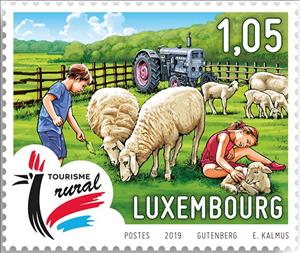Stamp: Children Petting Sheep (Luxembourg 2019)
Children Petting Sheep (Luxembourg 2019)
07 May (Luxembourg ) within release Rural Tourism Promotion (2019) goes into circulation Stamp Children Petting Sheep face value 1.05 Euro
| Stamp Children Petting Sheep in catalogues | |
|---|---|
| Colnect codes: | Col: LU 2019-10B |
Stamp is horizontal format.
Also in the issue Rural Tourism Promotion (2019):
- Stamp - Children Petting Sheep face value 1.05;
- Stamp - Couple Hiking face value 0.80;
Stamp Children Petting Sheep it reflects the thematic directions:
Biologically, a child (plural: children) is a human being between the stages of birth and puberty. The legal definition of child generally refers to a minor, otherwise known as a person younger than the age of majority. Child may also describe a relationship with a parent (such as sons and daughters of any age) or, metaphorically, an authority figure, or signify group membership in a clan, tribe, or religion; it can also signify being strongly affected by a specific time, place, or circumstance, as in "a child of nature" or "a child of the Sixties". There are many social issues that affect children, such as childhood education, bullying, child poverty, dysfunctional families, child labor, hunger, and child homelessness. Children can be raised by parents, by fosterers, guardians or partially raised in a day care center.
Sheep (pl.: sheep) or domestic sheep (Ovis aries) are a domesticated, ruminant mammal typically kept as livestock. Although the term sheep can apply to other species in the genus Ovis, in everyday usage it almost always refers to domesticated sheep. Like all ruminants, sheep are members of the order Artiodactyla, the even-toed ungulates. Numbering a little over one billion, domestic sheep are also the most numerous species of sheep. An adult female is referred to as a ewe (/juː/ yoo), an intact male as a ram, occasionally a tup, a castrated male as a wether, and a young sheep as a lamb.
Tourism is travel for pleasure or business; also the theory and practice of touring, the business of attracting, accommodating, and entertaining tourists, and the business of operating tours. Tourism may be international, or within the traveller's country. The World Tourism Organization defines tourism more generally, in terms which go "beyond the common perception of tourism as being limited to holiday activity only", as people "traveling to and staying in places outside their usual environment for not more than one consecutive year for leisure, business and other purposes". Tourism can be domestic or international, and international tourism has both incoming and outgoing implications on a country's balance of payments. Today, tourism is a major source of income for many countries, and affects the economy of both the source and host countries, in some cases being of vital importance.



